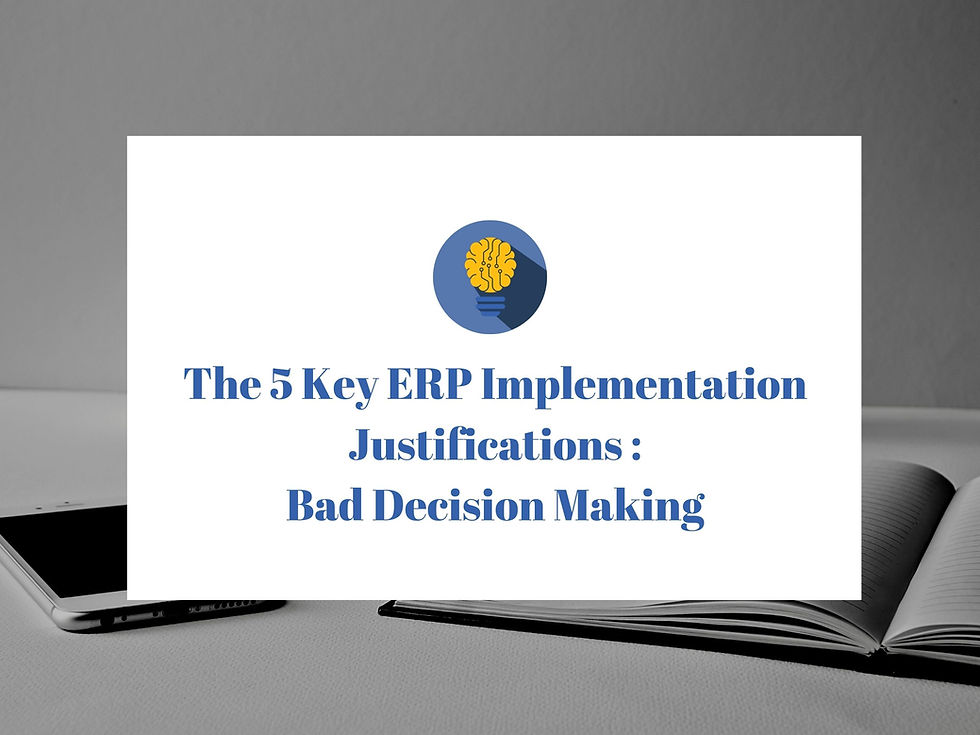
Note to reader – upcoming blog content will utilize a Human Resource specific ERP implementation but same model in any other scenario.
The fifth aspect in the 5 Key ERP Implementation justification in this blog will focus on:
Consolidation of Information Technology (IT) Systems
Cost Reduction
Business Process Reengineering
New Application Technology
Bad Decisions Making
Bad Decision Making
The goal of any system (or process for that matter) is to deliver information for leaders to make informed decisions to run an efficient business. Having a variety of systems with no consolidated data and inconsistent reporting are another foundational justification for a new ERP application.
If you live in Slide 1 – Currents State – Spaghetti and Meatball world that we discussed earlier in the Consolidation of Information Technology (IT) Systems blog, then you are aware of the challenges of not having data centrally housed, standardized and available to make the best operational and business decisions.
Don’t think this is real and a challenge to all organizations that don’t have a consolidated ERP application? How many times have you been sitting in a meeting with Finance and Human Resources leadership and this is the painful topic of conversation?
CFO – “My team tells me that we have 97 vacant positions in the company.”
CHRO – “Your information is wrong, we have 106 vacant positions in the company.”
CFO – “Well this is the report that my team got from your folks so not sure why you are saying it’s wrong?”
CHRO – “That was last week's report and it looks like someone has changed the spreadsheet as my version has more columns on it."
CFO – “Well how am I supposed to forecast labour costs if we aren’t using the same information?”
After about 2 minutes of this “back and forth” banter – someone else chimes in - but really shouldn’t be part of this conversation.
CEO – “Fine let’s stop the debate and just call it 101 vacant positions and move on!”
You might think that this is exaggerated; but an number of years back I was part of a company’s Executive Leadership Team and this was the topic of conversation – month after month after month – crazy right!
My CEO had to use "guesstimates" to make critical headcount business decisions. Totally acceptable! I often wonder how many other key information elements he was “settling for” across all areas of the business.
Fortunately, twelve months later his new ERP system gave him real-time data beyond his wildest dreams. Sure, it wasn’t perfect, but I knew that he was able to really to see and operate the company in new and different ways and it became crystal clear to me when said to the same Executive Leadership Team –
“How in hell did we ever run this company before we had this system?!”
Moral of the story - make sure you really understand the business reporting requirements during the ERP implementation selection process; because believe it or not that this the primary and in some cases (incorrectly) the only reason that executives want to undertake this initiative. Don’t undervalue this factor when you are making your case on why your organization should be introducing a new ERP; but also, don’t make it the only rationale.
Ready for a shocker? There are lots of additional factors to justify an ERP Implementation, but they really do fall into the categories we have discussed in these 5 blogs and my team and I are at your disposal to help navigate this initiative.
One final thought to help frame your thought process regarding the Key Reasons for ERP Justification...if you don’t like my “House” analogy.
Organizations often tend to think of ERP applications the same way people think about their personal car situation.
After 5-7 years your car costs more and more money – the factory warranty has run out and now major systems are breaking down, so repairs are costing more, and you need to find a “good mechanic” to make sure your car keeps running. Parts are tough to get because the manufacturer wants you to buy a new car so they have no incentive to keep items available, and you’re just bored with your old car – sound familiar.
Buying/Leasing an ERP Application or “new car” can be very expensive and time consuming. Let me and my team help you make sure that you get what you really need.
Still riveted 😊 – excellent – pick up my logic in the next blog in this topic series to find out where I discuss the 4 Key “Non-Traditional” Reasons – ERP Implementation Fail.
.png)

Commentaires